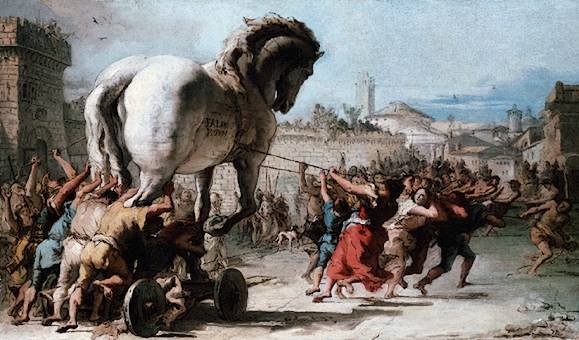
The events of the Trojan War set out in the Iliad are known to the whole world, but are they related to world history? In the XIX century, Gennrich Schliemann decided to prove that the war really was.
Homeric epic about the Trojan War refers to the masterpieces of world literature. The tragic history of the destruction of the Greeks by Troy is full of unforgettable episodes and figures: the beautiful Elena, whose escape with the Paris Trojan led to a ten-year siege of his city; the Greek kings Agamemnon and Menelaus are brothers who gathered a huge army to return Elena Menelaus's wife; the brave Greek hero Achilles and the trident Hector, who is not inferior to him in prowess; king of Troy Priam and his daughter — prophesying Cassandra, whose prophecies about the death of his native city no one believed; clever Odysseus, thanks to which the outcome of the war was decided in favor of the Greeks.
For the ancient man, the question of the reality of these characters and events did not stand. The Romans led their race from the Trojan hero Aeneas, who fled to Italy after the fire of Troy: his descendant Romulus later founded Rome. However, after the passage of centuries, Homer's compositions began to be perceived as beautiful tales.
Stubborn archaeologist
Entrepreneur Heinrich Schliemann (1822-1890) from the German Duchy of Mecklenburg, having made his fortune and traveling the world, at the age of 44 remembered his childhood dream — to study antiquity and unearth Troy.
Schliemann believed that she was in the place of Hissarlik Hill in Asia Minor (now — Turkey). He began excavations in 1870 and soon achieved success. The most sensational find was the so-called Priad Treasure — gold items around 2,400 BC, which Schliemann mistakenly associated with the epoch of Homer.
Later discoveries
Now the main attention of archeologists is attracted to more prosaic things, such as wreckage of guns, seeds or shards. These objects make it possible to make the most accurate and sensational conclusions, allowing a new look at the fate of ancient Troy. Ten successive cultural layers were discovered in Hissarlık. The oldest, designated as Troy I, corresponds to a walled village between 2900 and 2600 BC. Homeric Troy is a layer of VI (1700-1250 BC). The city was about ten times larger than it was supposed to be: around the already well-known fortress with the nobility's palaces, extensive settlements were excavated.

Long before Homeric times, Troy became a rich and powerful city, and therefore often subjected to raids by neighbors. Manfred Korfman of the University of Tübingen in Germany believes that the decade-long war was not: most likely, since the Bronze Age in the course of many small conflicts, this important trade and strategic center passed from hand to hand. The cause of his death around 1250 BC could well be an earthquake.
A sensational discovery sheds new light on the problem: a seal of the Bronze Age with Hittite hieroglyphs (the Greek alphabet did not yet exist) suggests that Troy was not a Greek city, but part of the Hittite state in the center of Anatolia. In this case, the story of her fate and, possibly, the proof of the Trojan War should be searched among the many Hittite documents found in Asia Minor.
Hi @mamasetta - I found your post on my daily history top list and believe your post is undervalued, so I upvoted and resteemed your post ! All the best !!
Peace, Abundance, and Liberty Network (PALnet) Discord Channel. It's a completely public and open space to all members of the Steemit community who voluntarily choose to be there.Congratulations! This post has been upvoted from the communal account, @minnowsupport, by Mamasetta from the Minnow Support Project. It's a witness project run by aggroed, ausbitbank, teamsteem, theprophet0, someguy123, neoxian, followbtcnews/crimsonclad, and netuoso. The goal is to help Steemit grow by supporting Minnows and creating a social network. Please find us in the